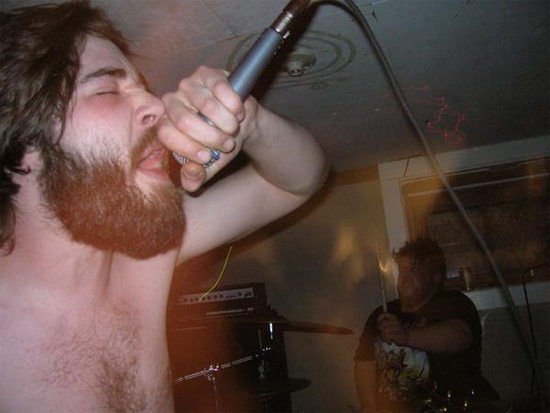Underground punk rock and hardcore feels like it’s more exciting about now than at any other time since I’ve been aware of it, which is pushing fifteen years. This is subjective, because it can’t not be. I mean, if you like your punk to have a superslick Pennywise-type gleam and/or ska parts, this is probably not a great era for the genre. On the other hand, there is more gold in the hills than there has been for a very long time if you like inexpertly recorded antisocial anti-anthems which sound like a timewarp back to the American Midwest circa 1984 and are played by needlessly sarcastic, adequately educated record collectors in their late 20s whose parents are loving and supportive despite being near-constantly disappointed by their progeny’s life choices. (The phrase, I believe, is “game recognise game”.) Here are some new records, some of which are kind enough to fit into the bracket I just created.
Jonah Falco is a Canadian fellow who has played an integral part in two of the most consistently ripping punk rock bands of the last decade. Fucked Up, for whom he plays drums under the nom de plume Mr Jo, you are probably familiar with if you’re reading a column about punk and hardcore on a website which doesn’t write about very much punk and hardcore; he’s also the guitarist in Career Suicide, whose loosely garagey interpolation of 80s HC has yielded snot-caked tunes for days. A couple of years back, he also recorded two demo tapes, under the name Mad Men, playing all instruments himself, and gave them to friends.
Come early 2010, this 12" turns up in various keen distros: white label vinyl in a plain white sleeve with a tracklisting glued on the back. Official word is that it’s a bootleg, but given Fucked Up’s obtrusive approach to verifying the ‘official’ nature of some of their releases, smart kids reckon this might be Jonah’s doing after all. If you’re reading this and silently decrying it as irrelevant wild goose chase collectorscum anti-marketing-dollar hypeman bullshit, shame on you – what kind of monster would deny maladjusted men with low self-esteem the chance to feel part of an exclusive club? Anyway, this record bangs hard: constantly threatening to be tuneful but mostly sticking to the splattery chaos of metal-flecked 80s icons like Die Kreuzen and Void. Side two ups the weird a mite, slathering reverbed vocals and martial drumming over the turmoil.
In both style and aesthetic, Mad Men could be deemed ‘mysterious guy hardcore’. Seriously? The scare quotes – that is an actual thing? Sort of, yes. It describes some bands with identifiable commonalities, which is generally how subgenres are constructed; it just doesn’t exist outside of a few messageboards. (At this point – also thinking of ‘hypnagogic pop’ and ‘wonky’ here – annoying people seems to be as good a reason as any for inventing your own name for a basically unnecessary genre.)
Dry Rot, from Ventura in California, pretty much tick all the boxes for being a mysterious guy hardcore band. They take their cues from the real fucking bizarre outliers of 80s HC – the aforementioned Void and Die Kreuzen, United Mutation, Flipper, the first two Meat Puppets records, maybe the Neos from Canada – their lyrics are cryptic and seemingly allegorical, and they’re openly Christian. They still catch heat for that last one, but it also appeals to burned-out punk cynics who are jaded enough about the form that what was once a red flag for conformity now appears rebellious in the grey light of 2010. Philistine (Parts Unknown Records), their debut album, is a great record that’s just peachy when it’s flailing away in the thrash pool, but gets yet more interesting when they toy with a brain-damaged take on dub (‘All The Crime In The World’) and something called ‘Can A Game Call Time?’ which sounds like Fleetwood Mac redubbed by the Skaters. In other words, their hardcore is so mysterious it’s often not hardcore at all.
The collaborative LP from Iron Lung, Walls and Pig Heart Transplant is not the above thing, but it is vaguely analogous to it. It’s a recording of a 2008 gig in Seattle where the three bands played a set together, and it successfully pours their respective styles – Iron Lung’s pared-down grindcore exactitude, Walls’ immensely negative hardcore churn and the industrial noise endurance test of PHT, itself an Iron Lung sideproject – into a mutating mould of monstrosity. There’s a Big Black cover (‘L Dopa’) inserted in there somewhere, which despite sticking out like a deformed thumb seems essentially fitting.
If you think that sounds like something you’d fuck with, you should probably take a punt at Geisha, a Bristol band who have been quietly deafening for the best part of a decade now. Maudit A Minuit is their third album; like the others it’s on the Superfi label, and like the others it finds them gorging on their own taste in Amphetamine Reptile/Drunks With Guns basementcore, olde tyme power electronics and proud heavy metal excess. What could be a regrettable cobbling of idioms joins together as one singular voice, and gives you the hairdryer treatment for 40 minutes. Superfi, since you didn’t ask, has basically been one of the best labels operating in the UK in the 00s, no fronting – so why don’t you go and find it on this very internet and buy the debut single from The Good Wife as well? They are a band from the south coast of England who have been in some other bands of varying note (Chariots, the vocalist Emile’s old posse, kicked it in their day) and have assembled to satisfy their lust for The Jesus Lizard, Oxbow and old Skin Graft Records oddities. Two songs, keywords ‘lurching’, ‘guttural’, ‘jazz-inflected’, ‘hacky reviewer’.
If you additionally buy the latest 45 by The Sceptres, a quartet resident in London and Guildford, it will be delivered to you by this wonderful nation’s grime-caked and outdated rolling stock, rather than a gleaming metal bird zooming over the Atlantic. In this manner you will increase the lifespan of this planet by about four minutes and ten seconds, which coincidentally is the total length of the two songs here (released on Dire, their own label). Frontwoman Bryony gets her Poly Styrene on to rousing effect while the instrument people – two of whom can also be found in The Shitty Limits, who you vaguely remember reading about in WH Smiths – make a trebly stab at Year Zero US punk that could, or perhaps even would, have been on Dangerhouse Records in 1978. This is a tossy way of telling you it’s really good. Comes in the thinnest paper sleeve you’ll ever see, outside of the three-decade-old UK DIY singles which get compiled on Messthetics CDs (and which The Sceptres are probably referencing thusly).
Airfix Kits live in Oakland but sound like a British band. This is partly because their singer, Allan McNaughton, is a Glaswegian ex-pat; but also because their songs are winningly jagged and calcified, the sound of the slow bleed from Wire and Gang Of Four circa their first LPs to the mid-80s Britshambles that John Robb just did a book about (Big Flame, Bogshed etc). The cover art to ‘Playing Both Sides’, their new seven on Dirtnap, is a photo of two youngsters leaning over their cans of Oranjeboom to get off with each other in a takeaway. ANY 11” PIZZA ONLY £2.90 tells you the location, and perhaps that of McNaughton’s head. His previous band, Giant Haystacks, sounded pretty similar to this minus the Oi-ish vocal backups; they were superb and if they had had even the slightest interest in ‘getting big’, it probably would have happened. Likewise Airfix Kits; I mean, post-punk is like totally over and McNaughton is probably sick of imbeciles in bars telling him his accent is really hot and just like the guy from Franz Ferdinand, but… he writes killer pop songs.
One reissue reviewed, to tip a hat to the fact that big-hearted archivists continue to wave their wangs at the supposed ephemerality of music, especially amateurish/minority interest/cheaply recorded music released on ‘dead’ formats. Also ‘cos someone was nice enough to send me a promo. Virulence existed from the mid to late 80s in California, and broke up shortly after releasing one album – If This Isn’t A Dream, which is also the title of this exhaustive CD, issued by Southern Lord. Most of the band promptly formed Fu Manchu, which is an arc to make you think: Virulence’s most evident influence, in their later years at least, was Black Flag’s My War, one of the most powerful transmissions of despairing hatred in the history of music. Fu Manchu is like what would happen if a bong, a bottle of Corona and a skateboard formed a band. Amplifier worship is the great leveller, one supposes. If you’re religiously down with that wigout-stuffed proto-sludge hardcore that Flag birthed back when (along with Bl’ast! and the Melvins, both stated influences on Virulence), this is worth hearing; for the dabblers, not exactly essential.
Southern Lord have also secured the signatures (I assume they have contracts) of Black Breath, a Seattle band who are probably more metal than hardcore. This only ‘matters’ if you personally find proto-black metal guitar skree and bands named after Repulsion songs obnoxious. In which case we can’t be friends anyway. Has he gone? Good. Heavy Breathing, Black Breath’s debut album, follows up their Razor To Oblivion EP, which the Lord re-released a few months back, and which totally destroyed. This is about on a par with it. Kurt Ballou of Converge is on production duties, and shines a cancerous sunlamp on this trashed afterparty; pretty much every genre of metal ever gets an airing, along with Swedish and Japanese HC extremism. This is out in about six weeks so you have time to pump hell of iron until you can benchpress a stegosaurus and/or listen to this record five times in a row.
And that, save for a breathless namecheck for some bands that I had designs on writing about here but gave the gasface in a frankly laughable effort to be ‘concise’ (Raspberry Bulbs, Failures, Pollution, White Wards, Diet Pills, Saturday’s Kids, Slices), is basically it. Most of these records, and ones like them, are scarcely available outside of DIY distros, so you’ll need to go and find Feast Of Tentacles, SNCL, La Vida Es En Mus, Opiate, Static Shock, Ho Distro and Superfi, which I already repped for. No-one will think you’re cooler or more interesting for liking this horrid and obscure music, but inside you will burst with self-satisfaction.



